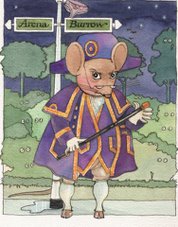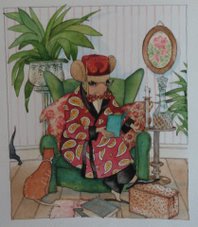A chance meeting at a Yorkshire bus stop on a clear, bright, sunny day shaped the course of my life for the next few years. I was soon to go to university to read history and politics, and I already knew that I had journalistic ambitions. The genial couple I chatted with as we waited for our up-country bus turned out to be Bill Oliver, deputy editor, chief leader writer, and art critic of The Yorkshire Post and his wife, Wynne. Our acquaintance ripened into friendship, and even before I started my degree course I formed the clear impression that Bill would welcome my eventual recruitment by the YP as his understudy.
In those days The Yorkshire Post was not just a widely read provincial daily paper. It had the ear of political circles ‘down south’. Owned by the Yorkshire Conservative Newspaper Company, its politics were liberal-tory of a Churchillian cast. These were the early days of the 1945 Labour government, whose election immediately after the end of WW2 sent shock-waves reeling through the propertied classes. Before the war the YP had been edited by Arthur Mann, a much respected figure in the C.P. Scott mould. His successor, W.L. Andrews, had been appointed from editing the more popular-style sister paper, the Leeds Mercury, and was suspected by some of wanting to take the YP down market. Bill Oliver had worked with WLA since starting as a cub reporter. I felt confident that, even in those days of paper rationing, when the YP published a four-page paper on three days a week and a bumper six-page issue on the other three days, Bill would secure me a place on the paper when I had finished my degree,
So I passed my three years at Cambridge without bothering too much about what I would do afterwards. Sure enough, when I had graduated Bill mentioned me to the Editor and I was invited for an interview. A business colleague of my father’s who knew Andrews also mentioned me to him. So I was more than a bit nonplussed that when I presented myself at the Victorian YP building in Albion Street, WLA seemed very vague as to who I was. After we had chatted generally for a while, he said “Oh, well, I’ll write to you”.
The letter duly came inviting me to join the YP in Leeds for a month’s trial as a junior sub-editor. The hours would be 6 pm until 1am, and the terms were £3 per week. I was living with my parents in Sheffield at the time, so had to hastily find digs for myself, which I succeeded in doing with a pleasant family whose house backed on to Headingley cricket ground. My hostess was musical, and had a nice piano which she kindly not only allowed me to practice on but encouraged me to have lessons with a friend of hers who was the head of the BBC music department in Leeds.
All seemed to go well for me in the YP subs’ room. The other subs were all older, experienced journalists who were happy to teach me the rudiments of the craft. Pieces of typed ‘copy’ were passed to each sub by the chief sub-editor, with a note indicating the length to which they had to be cut, and the size and nature of the headline required. My relatively humble items were a daily boiling down of the Radio Times list for the next day’s programmes, the weather forecast, and miscellaneous small stories about village fêtes, church bazaars and so forth which had been phoned in by local ‘stringers’ not all of whom were very literate. Sometimes it was necessary to get into a huddle with other subs to decipher what the sender meant. Other, more factual, conundrums had to be resolved by visits to the library, presided over by Bill North, a witty and congenial person who has remained a lifelong friend.
In those days, the mechanics of newspaper production were totally different from those of this internet age. The subbed stories were typecast in metal, and brought together in page frames before mould impressions were made and recast into semi-circular drums which were affixed to the rotary presses. Sometimes, a careless slip in the typecasting led to disaster. Not long after I joined the paper, the UN envoy to the Middle East, Count Bernadotte, was assassinated. Bill Oliver wrote a leading article about this. It was style practice to set the first word or two of a leading article in capitals. Bill’s piece began ‘COUNT BERNADOTTE, who was assassinated this morning, etc. etc.’ Alas, due to a compositor’s gremlin, the ‘O’ somehow slipped out of ‘COUNT’. When the editor received his pull of the first edition, he went bananas and the presses screeched to a halt.
At the end of the first month, I asked the chief sub whether I had passed my month’s trial. He said he would speak to the editor, and returned with the message: “carry on for another month”. So I did, only to get the same message at the end of the second month. At the end of the third month, I asked to see the editor. He was joviality itself. I told him that I was extremely grateful for the privilege of working on his distinguished paper, and very much wished to continue doing so. I would be glad if he would tell me whether he was going to put me on the permanent staff, and if so what my salary would be. He did not give me a direct reply. He said ‘You know, when I was on the Daily Mail, there was a chap there who was a temporary for thirty years, and when he asked to be put on the permanent staff they sacked him’. He laughed heartily at the recollection, and concluded the interview by saying ‘I’ll think it over and let you know’.
Christmas was approaching, and I had been doing this night work for nearly four months for a meagre £3 a week. My father, understandably, was getting restless. He had of course been subsidising me as the £3 didn’t cover my rent. So I sat down and wrote a very carefully composed letter to WLA, pointing this out and saying that I really would appreciate a clarification of my position. The day after I handed in the letter he sent for me. His urbanity had vanished. He said: ‘It’s obvious that we can’t come to terms. You’d better take a month’s notice’. The effrontery of this attempt to get another month’s cheap labour out of me was astonishing. I said ‘I’d rather leave at the end of this week’. ‘Oh do’, he said – and handed me a letter.
I didn’t open this until I was retreating along the oak-panelled red-carpeted corridor from his office, reeling with shock. I have always wished I had opened it in his room, because I would have thrown it at him. It was a short, brutal dismissal note, containing the immortal sentence ‘I do not believe in keeping on men who are dissatisfied’. I have it still among my grislier souvenirs.
When I went back to the subs’ room there was consternation. The chief sub said he didn’t want me to leave, and was very satisfied with my progress. Would I like him to have a word with the editor? I said not really – there didn’t seem to be any point. Some of the older subs informed me that if I had stuck it out until I had been there for six months, I could have joined the NUJ and the paper would have been obliged to pay me the minimum rate of six guineas weekly. Andrews obviously knew this, although I didn’t.
And the aftermath? I went home to Sheffield with my tail between my legs. It took me nine months before I obtained another job – in London, where I had decided to go to read for the Bar.
Bill Oliver retired to bed for a week with severe stomach ache.
WLA went on from strength to strength, becoming one of the first chairmen of the newly established Press Council, and receiving a knighthood for his services to journalism.
One of those, I suppose, was to ensure that I never coveted his, or any other, editorial chair.

